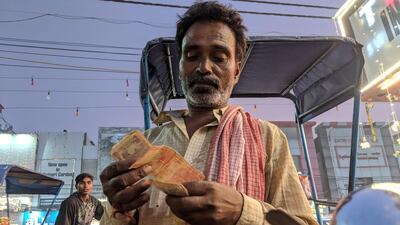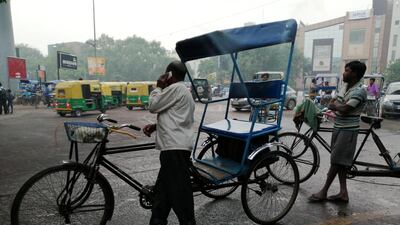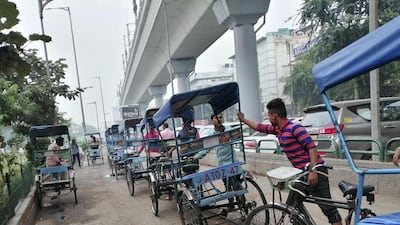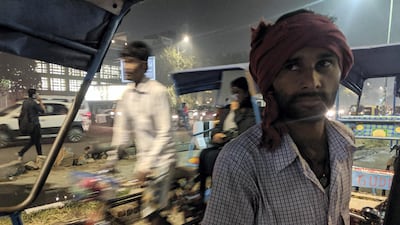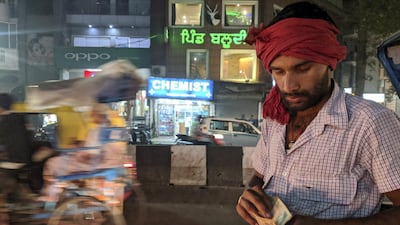As Satyadev Singh sits on his flashy cycle rickshaw waiting for passengers in a bustling market in central New Delhi he fights a bout of coughing.
"I feel choked because of the bad air," said Mr Singh, one of the thousands of poor migrant rickshaw pullers in the capital city. They are just some of the tens of thousands who take to the streets every day to earn their living despite the toxic smog that has settled over the Indian capital since last week.
Authorities in Delhi declared a public health emergency last Friday after pollution levels shot up to unprecedented levels in the city described as a "gas chamber". Officials called on people to stay indoors or wear protective masks.
But Mr Singh and many workers like him have ignored the health hazards so they do not lose their livelihood, making them vulnerable in the foul air. Mr Singh earns about $5 (Dh18) a day ferrying passengers around the city.
"I work for 10 hours a day and breathe the polluted air. I don't know, but this clearly taking a toll on my health. I am coughing for almost a week now," Mr Singh told The National.
"My eyes are burning and I feel shortness of breath while pedalling the rickshaw," he said.
His only protection against the toxic air is a coarse cotton cloth wrapped around his face. But doctors say this is ineffective in places like Delhi where pollution levels average 10 times the World Health Organisation safe limits.
Medical experts say people in Delhi breathe air filled with high levels of particulate matter called PM 2.5 – dust measuring less than 2.5 microns – that penetrates deep into the lungs and enters the bloodstream, with a deadly impact on respiratory and cardiac health.
While the WHO's recommended safe level of PM 2.5 is no more than 25 micrograms per cubic metre, on Sunday the measure went beyond 999 in many locations. It forced authorities to shut schools and ask people to avoid all outdoor activity.
Two Bangladeshi cricketers had reportedly vomited on the pitch and several complained of itchy eyes ahead of their Twenty20 match in the capital city.
A city of rickshaws
Tricycle-rickshaws are ubiquitous in the city of nearly 20 million people that lacks an effective mass transport system.
They have become the most convenient modes of transport on New Delhi’s overcrowded streets and are often used to convey commuters over the last few kilometres of their journey.
Rickshaws have become a source of income for tens of thousands of migrant workers who move to the capital from poor Indian states to earn a living, often sleeping on pavements or in cramped shanties.
Many say that saving enough to send home leaves them without nutritious meals and very little to live on. Their immunity is very low and they suffer from a variety of occupational and other illnesses.
They brave sweltering summer heat and monsoon rains to ferry school and college students, office goers, housewives and businessmen for as little as Dh1 for a trip of almost a kilometre.
But experts say that the winter poses a unique challenge to their health as they are the worst-affected by pollution as they pedal through the thick blanket of smog, putting their lungs under tremendous pressure.
Doctors warn that prolonged exposure to polluted air can cause irreversibly harm to the body, even lung cancer and brain damage.
Dr Arvind Kumar, the chairman of the Centre for Chest Surgery at Sir Ganga Ram Hospital in New Delhi, said workers such as rickshaw pullers are 30 to 40 times more vulnerable than those who stay indoors.
While on average an adult human breathes 25,000 times a day and inhales 10,000 litres of air, rickshaw pullers breathe 50,000 times a day, Dr Kumar said.
“Now imagine, with the polluted air, the amount of dust particulate matter they breathe in. The particulate matters are deposited in our lungs, gets absorbed in our blood and goes to various organs of the body causing heart, brain, lung and liver problems,” he said.
Smog or not, we have to work
"It is very difficult for me to pull the rickshaw when the pollution levels are high but if I don’t work, I will have no money to send to my family. How will my children eat?” said Manoj Lohar. He said he earns about Dh20 a day, half of which he saves for his family in West Bengal including his three children.
"Half of my daily income goes in paying the rent of the rickshaw and then I have to buy day-to-day supplies,” he said. “I cannot afford a mask but I am worried about how I will pay for the doctor’s fee if I fall sick.”
Of the 30 most polluted cities in the world, 22 are in India. Delhi sits comfortably at the top of the list of highest average annual PM 2.5 levels, giving it the unenviable crown of the city with the most polluted air in the world.
Just two days this year – one in July and the other in August – have had air quality levels in the “good” bracket.
The megacity struggles with toxic air pollution throughout the year, largely caused by a concoction of vehicle emissions, construction dust and industrial pollution.
But each winter the post-harvest burning of crop stubble in neighbouring states brings tonnes of toxic smoke to the city, compounding the issue.
Mahesh Palawat, the chief meteorologist for private weather forecaster Skymet, warned that pollution levels around Delhi would remain bad until the government curbs the sources of pollution.
“Population congestion and concentration is more in the city and it is very difficult to contain pollution levels unless there is will power from both the government and public,” he said. “Traffic needs to be cut down and construction sites need to be covered.”
The authorities have banned construction in the city, shut thermal power plants and introduced the odd-even number plate system for private cars to reduce traffic, but many feel the measures are not enough.
Mr Palawat believes the situation will not improve unless the rules are followed and strictly enforced.
"There are rules like covering the construction sites but people do not follow it. In order to bring a solution, both the government as well as public will have to take work together," he said.
The Supreme Court on Wednesday criticised the central government for not taking action over rampant burning of crop stubble in regions outside Delhi.
"You just want to sit in your ivory tower and rule. You are not bothered and letting the people die," the court said.

